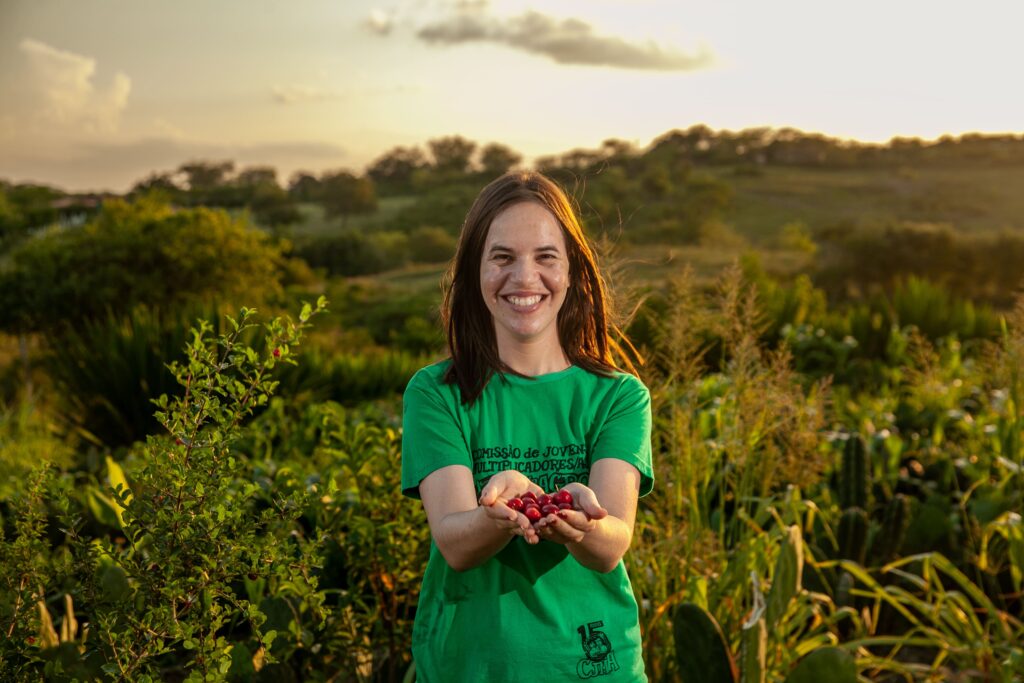Together with its partner organizations, terre des hommes schweiz is committed to sustainable and ecological agriculture in several countries. A new study from Brazil also shows that agroforestry systems supported by terre des hommes schweiz mitigate the effects of climate change.
Larissa Silva de Oliveira is a farmer in Brazil. The 19-year-old was initially ashamed of her job, but now she is visibly proud of it. "I used to have preconceived ideas and was ashamed of being a farmer. Today I'm proud of it because I'm my own boss," she says in the interview. Larissa Silva de Oliveira has converted her parents' farm in the dry, rural north-east of Brazil to sustainable agroforestry - the conscious integration of trees and shrubs in agriculture. By mixing arable and pasture land with trees, she is increasing biodiversity and making the fields more resistant to climate change. Since the changeover, the farm has been profitable again and finances her family's livelihood.
Against hunger and the climate crisis
Larissa Silva de Oliveira is not an isolated case. Together with its partner organization Centro Sabiá, founded in 1993, terre des hommes schweiz is working in Brazil to combat hunger and the climate crisis through sustainable, agroecological agriculture. Centro Sabiá offers several hundred young people concrete alternatives so that they can develop future prospects through organic farming and actively contribute to the development of their villages. By providing expert advice and support, Centro Sabiá helps young people to shape their agricultural ecosystems in such a way that they can produce and sell food - and thus improve their food security and income. In its 30 years of activity, Centro Sabiá has already advised over 15,000 families and introduced more than 1,000 agroforestry systems - a success story!
Larissa Silva de Oliveira also acquired her knowledge of sustainable, agroecological agriculture in the agroforestry courses at Centro Sabiá. "That was the turning point for gaining a visionary perspective," says the young Brazilian. She learned a lot in the process. About animal feed or fertilizing and much more. "We didn't know much about agriculture before." Larissa Silva de Oliveira lives with her father Antonio, her mother Gilda and her brother Danilo. Today, she and her family own cows, goats and chickens and grow maize, beans, manioc and papayas. They feed the animals with cactus leaves. They collect water in a cistern for irrigation. They do without pesticides and burning. They produce fertilizer and biogas from cow dung and cook with it. Everything is sold on the nearby market or they use it themselves. "I can clearly say that our family can now make a living from farming," says Larissa Silva de Oliveira with satisfaction.
Agroforestry systems protect the climate
Climate justice is of great importance to terre des hommes schweiz (see box). Against this background, not only the successes of the project are all the more pleasing, but also the results of a new study by the University of Pernambuco in Brazil in cooperation with the Centro Sabiá on agroforestry systems and their positive effect on the climate. The study shows that agroforestry systems supported by terre des hommes schweiz are effective and can mitigate the effects of climate change. For the first time, a study has shown that agroforestry systems can remove up to 40 percent more CO2 from the atmosphere and store it in trees than traditional cultivation.
The mixture of arable and pasture land with trees increases biodiversity and makes the fields more resistant to climate change. Up to 320 different species have been counted in agroforestry systems, compared to only 40 in monocultures. The soil also remains more moist, requires less water and regenerates better. In addition, these ecological systems with a circular economy give families autonomy and ensure a healthy diet.
Young people are multipliers
Larissa Silva de Oliveira will certainly also be pleased with these positive study results from the University of Pernambuco. She is already a role model for many young people in her region and would like to take on this role even more in the future. "My dream for the future is to influence young people so that they have a comprehensive vision for agriculture," she says, describing herself as an "agroecological multiplier".
What is special about the Centro Sabiás project is that the young people not only implement agroecological production on their land and increase their food diversity and income, but also act as multipliers of this knowledge. The project also aims to ensure that other communities and organizations can benefit from the experience gained over the past 30 years - and thus open up prospects for as many other young people as possible.
Our commitment to climate justice
Climate justice is of great importance to terre des hommes schweiz, because climate change is real and its consequences hit the poorest hardest. Many of the young people with whom and for whom terre des hommes schweiz works have long been affected. Livelihoods are being destroyed. In north-eastern Brazil, for example, the drought is worse than ever. In the Sahrawi refugee camps in the Algerian desert, the temperature rises to 50 degrees in summer. And in Mozambique, increasingly violent cyclones regularly lead to humanitarian disasters. That is why terre des hommes schweiz is committed to climate justice and supports young people in Switzerland and in the project countries together with partner organizations in their commitment.
Would you also like to make a contribution to climate justice? We would be delighted if you would support our work and thus also sustainable projects.


